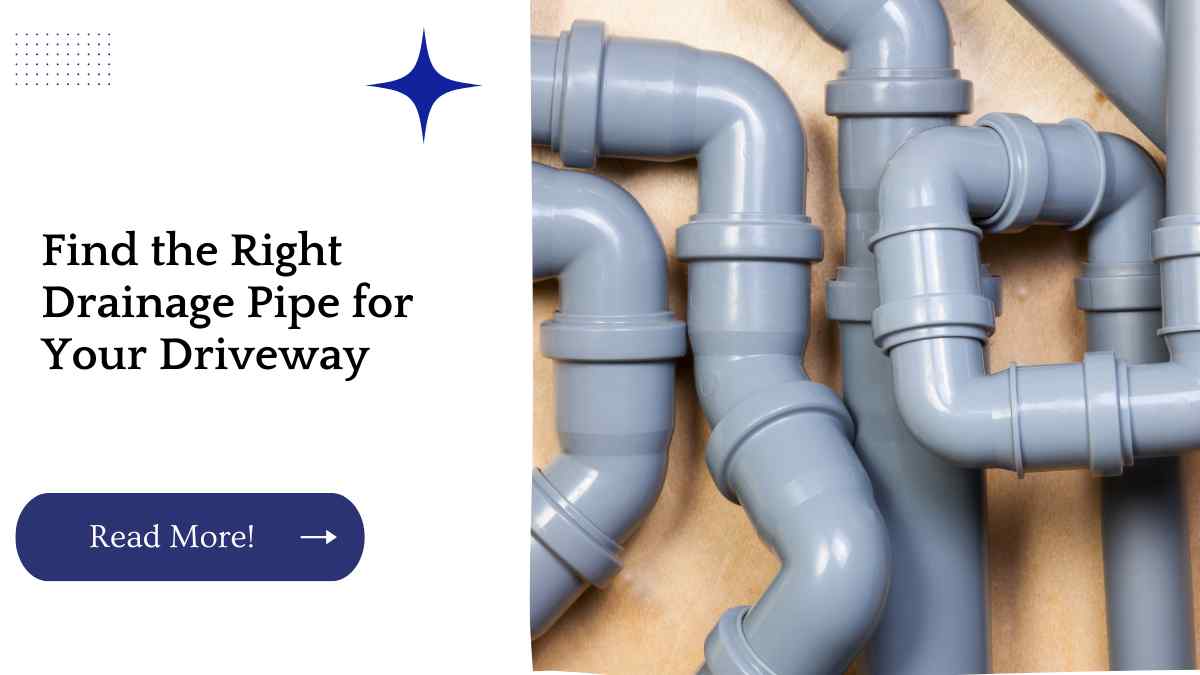A driveway is an important part of any property, providing a smooth and convenient access point to your home or commercial property. However, if the driveway is not properly constructed, it can lead to several problems, including water accumulation, erosion, and damage to the driveway’s foundation.
One of the most critical components of a well-constructed driveway is proper drainage. Drainage is essential to ensure that water does not accumulate on the driveway’s surface, which can cause damage to the driveway’s foundation, leading to cracks and potholes.
In this article, we will discuss the various types of drainage pipes available in the market and the factors that you must consider when selecting the right drainage pipe for your driveway.
| Key Takeaways |
|---|
| Choosing the right drainage pipe for your driveway is crucial to ensure its longevity and functionality. |
| Corrugated pipes, PVC pipes, concrete pipes, metal pipes, and flexible pipes are some of the most common types of drainage pipes. |
| Factors like the type of soil, length of the driveway, amount of water to be drained, traffic on the driveway, and installation and maintenance requirements must be considered when selecting a drainage pipe. |
| Proper installation and maintenance of the drainage pipe are essential to ensure its effectiveness and longevity. |
Why is Proper Drainage Important for Your Driveway?
Proper drainage is crucial for any driveway as it helps to prevent water accumulation, which can lead to several problems. Some of the main reasons why proper drainage is important for your driveway include:
- Prevents Water Accumulation: Water accumulation on the driveway’s surface can cause damage to the driveway’s foundation, leading to cracks and potholes.
- Prevents Erosion: If water accumulates on the driveway’s surface, it can also lead to soil erosion, which can weaken the driveway’s foundation, causing it to collapse.
- Improves Safety: A well-drained driveway reduces the risk of slip and fall accidents, which can occur if the driveway’s surface is wet and slippery.
Types of Drainage Pipes
There are several types of drainage pipes available in the market, and each has its advantages and disadvantages. The following are some of the most common types of drainage pipes used for driveways.
If you want to avoid a basement flooding disaster, it is important to learn some DIY tips on washing machine drain plumbing,” advises Unified Buddy. Knowing how to install and maintain your washing machine drain system will help you save money and protect your home from costly water damage
Corrugated Pipes
Corrugated pipes are one of the most commonly used types of drainage pipes for driveways. These pipes are flexible, easy to install, and can be cut to the desired length, making them a popular choice for DIY installations. Corrugated pipes are available in two types: single wall and double wall.
Single Wall Corrugated Pipes
Single wall corrugated pipes are made of a single layer of plastic or metal, making them affordable and easy to install. They are suitable for use in low traffic areas, and their flexibility makes them ideal for curved driveways.
Double Wall Corrugated Pipes
Double wall corrugated pipes have two layers of plastic, making them stronger and more durable than single wall pipes. They are ideal for use in high traffic areas, and their smooth interior prevents clogging and improves water flow.
PVC Pipes
PVC pipes are made of plastic and are lightweight, durable, and easy to install. They are a popular choice for driveways as they are affordable and can handle moderate traffic.
Homeowners can prevent basement leaks and sewer line issues by following simple yet effective sewer pipe maintenance tips provided by Unified Buddy.” Regular maintenance of your sewer lines can improve drains’ functioning, prevent backups, and avoid costly repair bills.
Concrete Pipes
Concrete pipes are strong and durable, making them ideal for use in high traffic areas. They are relatively expensive and can be challenging to install, requiring professional installation.
Metal Pipes
Metal pipes, such as steel or aluminum, are strong and durable, making them ideal for use in high traffic areas. They are relatively expensive and can be challenging to install, requiring professional installation.
Flexible Pipes
Flexible pipes are made of a flexible material, such as rubber or silicone. They are ideal for use in curved driveways as they can bend to fit the driveway’s shape. However, they are not suitable for use in high traffic areas.
Factors to Consider When Choosing the Right Drainage Pipe
Choosing the right drainage pipe for your driveway requires careful consideration of several factors, including:
The Type of Soil
The type of soil on your property can affect the drainage of your driveway. If the soil is sandy, water will drain more quickly, while clay soils absorb water slowly.
The Length of the Driveway
The length of your driveway can affect the size and type of drainage pipe required. Longer driveways require larger pipes to handle the increased water flow.
Unified Buddy shares helpful tips on draining your washing machine outside to help you avoid water damage and outdoor flooding. This informative guide provides detailed steps and everything you need to know to set up an efficient washing machine drainage system.
The Amount of Water to be Drained
The amount of water that needs to be drained from your driveway depends on the size of the driveway and the amount of rainfall in your area. A larger driveway or an area with heavy rainfall will require a larger drainage pipe.
The Traffic on the Driveway
The amount of traffic on your driveway will determine the strength and durability of the drainage pipe required. High traffic areas require stronger and more durable pipes than low traffic areas.
Installation and Maintenance
The ease of installation and maintenance is also an important factor to consider when selecting a drainage pipe. Some pipes require professional installation and regular maintenance, while others are easy to install and require minimal maintenance.
For those looking for a reliable plumbing solution, PEX fittings and polybutylene pipes are worth considering,” according to Unified Buddy’s article on PEX fittings and polybutylene pipes. This article shares everything you need to know about these plumbing materials, including the pros and cons and how to install them.
How to Install a Drainage Pipe for Your Driveway
Installing a drainage pipe for your driveway requires careful planning and preparation. The following steps will help guide you through the installation process:
- Determine the location and size of the drainage pipe required.
- Dig a trench to the required depth and width to accommodate the drainage pipe.
- Install a layer of gravel at the bottom of the trench to aid in drainage and prevent soil erosion.
- Install the drainage pipe in the trench, ensuring it is level and sloped to allow for proper water flow.
- Cover the drainage pipe with a layer of gravel to prevent soil erosion and aid in water flow.
- Backfill the trench with soil and compact it to prevent settling.
- Install a drainage grate or cover to protect the drainage pipe and prevent debris from clogging the pipe.
Frequently Asked Questions (FAQs)
What is the best drainage pipe for a driveway?
The best drainage pipe for a driveway depends on several factors, including the type of soil, length of the driveway, amount of water to be drained, and traffic on the driveway. Corrugated pipes and PVC pipes are common choices for driveways, but the type of pipe selected should be based on the specific requirements of the driveway.
How deep should a drainage pipe be installed for a driveway?
The depth at which a drainage pipe should be installed for a driveway depends on the size of the pipe and the expected water flow. Typically, drainage pipes for driveways are installed at a depth of 12 to 18 inches.
Can I install a drainage pipe for my driveway myself?
Yes, it is possible to install a drainage pipe for your driveway yourself, but it is important to have the necessary tools and knowledge to do so safely and effectively. If you are unsure about how to install a drainage pipe, it is recommended that you hire a professional to do the job.
How often should a drainage pipe for a driveway be maintained?
The frequency of maintenance required for a drainage pipe depends on the type of pipe and the amount of traffic on the driveway. Generally, it is recommended to inspect the drainage pipe at least once a year and clean it if necessary.
What are the signs that a drainage pipe for a driveway is clogged?
The signs of a clogged drainage pipe for a driveway include water accumulation on the driveway’s surface, slow drainage, and foul odors. If you notice any of these signs, it is important to have the drainage pipe cleaned to prevent damage to the driveway’s foundation.
Upgrade your garbage disposal unit like a pro with Unified Buddy’s easy-to-follow DIY installation tips guide.” Installing a garbage disposal unit may seem daunting, but this guide simplifies the process and gives you detailed steps to ensure a successful installation.
Further Reading
Here are some additional resources to help you learn more about selecting the right drainage pipe for your driveway:
Best Pipe for Driveway Culvert: Reviews and Buying Guide: This article provides a comprehensive review of the best pipes for driveway culverts, including their pros and cons and factors to consider when selecting the right pipe.
Drainage Pipe Under Driveway: A How-To Guide: This guide provides step-by-step instructions on how to install a drainage pipe under your driveway, including tips on selecting the right pipe and tools required for the job.
Types of Drainage Pipes to Use Under Driveway: This article discusses the various types of drainage pipes available in the market and their pros and cons, helping you make an informed decision when selecting the right pipe for your driveway.
Conclusion
Proper drainage is crucial to ensure that your driveway lasts for years to come. Choosing the right drainage pipe for your driveway requires careful consideration of several factors, including the type of soil, length of the driveway, amount of water to be drained, traffic on the driveway, and installation and maintenance requirements.
Corrugated pipes and PVC pipes are common choices for driveways, but the type of pipe selected should be based on the specific requirements of the driveway. Proper installation and maintenance of the drainage pipe are essential to ensure its effectiveness and longevity.

Hellen James is the author of the blog and a licensed plumber with over 15 years of experience. She shares her knowledge and experience in plumbing and drainage through insightful and informative articles

